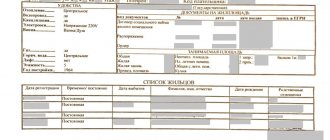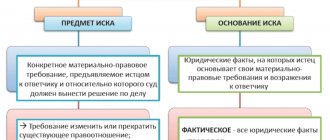January 3, 2019
Registration of a temporary registration for a relative or an outsider in the future forces homeowners to be puzzled by the issue of deregistering these persons, including without their consent in the event of a conflict or the temporary resident leaving without warning in an unknown direction. This procedure can be carried out in various ways depending on the current situation.
The concept of temporary registration
Temporary residence of citizens for a period of more than 90 days in a residential building other than their place of permanent residence is documented in the form of a Certificate of Registration at the place of residence. In everyday life, such registration is called temporary registration. Important: temporary registration does not cancel or interrupt the period of permanent registration at the place of residence. No marks about temporary registration are made in the citizen’s passport; the certificate of temporary registration only confirms the legality of the citizen’s presence in a particular premises.
The procedure for registration of temporary registration, as well as deregistration of citizens at the place of residence, is regulated by Order of the Ministry of Internal Affairs of Russia dated December 31, 2017 No. 984 and Government Decree No. 713 dated July 17, 1995.
Validity period for temporary registration
Registration at the place of residence can be issued for a period of up to 5 years. The minimum period of validity of temporary registration can be any (1 month, six months, etc.). The specific period of validity of the temporary registration certificate is determined by an agreement reached between the owner of the property (main tenant) and the person temporarily moving into the premises.
Grounds for deregistration during temporary registration
Decree of the Government of the Russian Federation No. 713 identifies three cases among the grounds for deregistering citizens at their place of temporary residence.
1. End of stay
The law states that the main reason for deregistering a person from his temporary residence address is the expiration of the registration period for which the registration was issued. This period is indicated in Form No. 3 of the Certificate. In this case, the owner of residential real estate and his tenant do not need to take any action to remove the latter from registration. A temporarily registered person is automatically discharged from his place of temporary residence, and Certificate Form No. 3 becomes invalid.
2. Early departure
If a temporary tenant left the housing before the expiration of the period of stay specified in Form No. 3, then the law of the Russian Federation allows him to be deregistered in one of the following ways: Personal application of the tenant to the Department of Internal Affairs of the Ministry of Internal Affairs at the place of registration with an application for deregistration. 2. Independent submission of an application to the migration department of the Ministry of Internal Affairs by the owner of the property or his main tenant (in case of social rent). Important: the homeowner has the opportunity to send such an application by mail or using the electronic government services service.
3. Cancellation of registration
Cancellation of temporary registration is possible if such registration was issued without the knowledge and consent of the owner/tenant/other legal holder of the residential premises. This procedure is implemented by the Department of Internal Affairs of the Ministry of Internal Affairs in an application form, i.e. after the relevant application is submitted by the owner of the property.
How to discharge a person with temporary registration from an apartment?
Depending on the specific situation, you can discharge a person from an apartment as follows:
- Upon expiration of the rental or rental agreement. In this case, temporary registration ends automatically and residents must leave the apartment.
- If there are legal grounds, the owner can apply to the registration authorities with an application to evict the tenants.
- Cancellation of temporary registration by the authorized body if it reveals that the registration is fictitious.
All grounds and the process of discharge are determined by Decree of the Government of the Russian Federation No. 713 of July 17, 1995 (as amended on May 25, 2017), as well as Federal Law of the Russian Federation No. 5242 “On the right of citizens of the Russian Federation to freedom of movement, choice of place of stay and residence within the Russian Federation” .
Reasons for filing a claim
The homeowner has the right to decide independently who and for how long to provide a “roof over their head”, however, a decision on how to discharge a temporarily registered person before the expiration date of registration without a trial cannot be made. To make a positive verdict, the court must indicate compelling reasons for the need to deregister:
- Change of owner of residential premises. For example, a concluded purchase and sale agreement does not oblige the deregistration of absolutely all persons at the time of actual transfer to the new owner. However, the buyer will refuse the transaction due to registered citizens and the obligation to provide the purchased apartment during the specified period.
- Violation of neighbors' rights or inappropriate content, including:
- non-payment of provided housing and communal services;
- leading an immoral lifestyle with noisy gatherings, drinking, scandals and receiving guests at inappropriate times;
- failure to comply with fire safety and sanitary standards.
- Use of residential premises for purposes other than residence. Failure to comply with a direct ban on business activities in terms of:
- organization of warehouses and utility rooms;
- provision of hotel services;
- opening production units;
- use for missionary activities.
- Subletting to third parties subject to prohibition in the contract.
- Premature departure, giving the right to early discharge of a temporary tenant:
- conscription into the army, confirmed by a certificate from the military registration and enlistment office;
- conviction for committing a crime to imprisonment according to a guilty verdict;
- absence for unknown reasons, confirmed by testimony of neighbors and permanent residents.
If at least one of the above reasons is present, the court will decide to discharge a temporarily registered citizen from the apartment, releasing the owner from paying utility bills for the absent tenant or violator of public order.
Grounds for discharge without consent
Discharge of a resident without his consent is possible if there are compelling reasons. The homeowner must provide evidence of these reasons to the registration authority. Russian legislation provides the following grounds for forced deportation:
- The owner did not agree to the registration of this person.
- The tenant left the premises before the end of the registration period.
- During registration, the tenant provided false information, that is, the registration is fictitious.
- The tenant violates sanitary and other standards for the use of residential premises, about which its owner has documentary evidence and witness testimony.
It should be taken into account that when parents are discharged, the registration of their minor children is automatically canceled. But in some cases, problems may arise with the guardianship and trusteeship authorities.
general information
Does a property owner have the right to evict someone without consent?
Therefore, if the owner of the property decides that the neighborhood is no longer acceptable, and the grounds have developed in his favor, there is nothing strange in the fact that he can carry out the deregistration procedure.
The discharge procedure can occur in different ways. The first and most acceptable for this situation is by agreement with what is prescribed. In this situation, the parties discuss the main points of the procedure and carry it out voluntarily through the passport office, without involving other authorities.
If the registered tenant does not want to deregister voluntarily or you cannot contact him at all, but you will have to carry out actions without obtaining the consent of the other party, that is,
through the courts
The procedure for discharging a person with temporary registration
Cancellation of temporary registration requires compliance with the algorithm of actions. This is also important for subsequent legal proceedings, because the court will check whether the owner of the premises complied with the requirements of the law when deporting its residents.
Expiration of registration period
In cases where the basis for deregistration is the expiration of the rental agreement, the process will take place without litigation. This is due to the fact that the law does not allow unilateral extension of this type of agreement, which means that residents will not be able to renew registration without the owner’s consent.
The owner of the premises needs:
- Submit an application to the Main Directorate for Migration of the Ministry of Internal Affairs of the Russian Federation (formerly the Federal Migration Service). This can be done during a personal visit to a branch of the migration authority or through the State Services portal. The application is written in free form, but in each department of the migration service the applicant will be given a sample for its preparation.
- Submit documents. Along with the application, it is important to submit: a copy of your passport, an extract from the Unified State Register or a certificate of registration of ownership of housing, and a rental agreement.
It is important to note that if the apartment belongs to several people, everyone must sign the application.
Voluntary deregistration
In some cases, it is possible to agree with the tenant on his voluntary departure. In this case, it will be possible to discharge a tenant with temporary registration without the participation of government authorities. In this case, the owner needs:
- Write notices to the tenant in free form. This document must include all aspects of their relationship and the reasons why he wants to discharge the resident.
- Send this document by valuable letter with an inventory. This is important for recording the fact that the letter was sent and received by the tenant.
If the tenant refuses to move out or ignores such notice, the apartment owner will have evidence of an attempt to resolve the issue by agreement of the parties. With these documents he will be able to go to court.
Extract by court decision
When attempts to reach an agreement with the tenant are unsuccessful, you need to contact the district court at the defendant’s place of residence. The process of forced eviction through the court includes the following stages:
- Filing a claim. In this application, you must indicate the details of the owner, tenant, the object of the dispute and describe all the circumstances that led to the request for the tenant’s discharge. The application is drawn up in 4 copies - for the plaintiff, defendant, court and migration service.
- Collection of documents. The plaintiff must submit a passport, documents on ownership of the property, an agreement with the management company and certificates of the number of registered persons. If his interests are represented by a lawyer, then an appropriate power of attorney will be required.
- Notice of intention to go to court. The plaintiff must send copies of the application to the court and the main documents in the case to all participants in the case.
- Pay the state fee according to the details that will be issued at the court office. A receipt for payment must be attached to the case documents. Without it, the claim will not be considered.
- Filing a claim. The claim must be submitted to the office of the district court at the location of the apartment from which the tenant must be discharged. All documents related to the case (originals and copies, with the exception of the original passport) are submitted along with the application. A stamp and registration number are placed on the copy of the claim when it is registered.
- Acceptance of the claim for production. The court is given 5 days to consider the application. After this period, the plaintiff and other participants in the case must be notified of its acceptance for consideration or refusal to do so.
- Court hearing. The consideration of the case requires the presence of all parties, but if the defendant does not appear, the court will make a decision in his absence.
- Making a decision. If the claim is satisfied, the court will issue a ruling on the forced eviction and discharge of the tenant. Such a document is published after the court decision enters into force. All parties to the case will receive copies of this resolution.
- Defendant's statement. This action ends the process. The necessary note in the house register is made by an employee of the registration authority based on a court decision.
It must be taken into account that, according to Article 132 of the Code of Civil Procedure of the Russian Federation, the plaintiff must notify the other parties to the case about the court hearing.
What documents are needed?
The composition of the package of documents for filing with the court is determined in Art. 132 Code of Civil Procedure of the Russian Federation. Specifically, to deprive a temporary resident of his registration, you will need:
- original and copy of the owner’s passport (if one of the owners is a minor child - birth certificate);
- a copy of the passport and a lawyer’s power of attorney (if available);
- certificate of registration of ownership of residential premises (for residential property registered after 2021 - extract from the Unified State Register of Real Estate);
- agreement on the emergence of relations, which served as the basis for temporary registration (hiring, use, etc.);
- an extract from the house register (the service is provided by the regional department of the Main Directorate for Migration of the Ministry of Internal Affairs of the Russian Federation at the location of the apartment);
- financial statement of a personal account from the Management Company or through the State Services portal;
- written confirmation of the circumstances on which the plaintiff’s claim is based (testimony of neighbors, overdue rent payments, etc.);
- a written request to vacate the premises and deregister at this address;
- postal documents on sending notifications of copies of the application and documents to all interested parties to the dispute;
- check for payment of state duty.
The need to collect all documents is aimed at providing a detailed substantiation of the owner’s claim and a positive judicial result.
Statement of claim for the discharge of a citizen with temporary registration
Statements of claim must be drawn up taking into account the requirements of Article 131 of the Code of Civil Procedure of the Russian Federation. Depending on the aspects of the situation, such a statement may have the following headings:
- On recognizing the defendant as having lost the right to use residential premises.
- On recognizing the defendant as not having acquired the right to use residential premises.
The first version of the title of the claim is used if the defendant occupies the property and does not want to move out, the second if he does not occupy it and does not try to move in, but is registered there.
The claim must contain the following information:
- Name of the court.
- Full name, date of birth and place of registration of the plaintiff and defendant.
- Name of the registration authority.
- Housing ownership information.
- Date of temporary registration of the resident.
- Claims against the defendant.
- The grounds for his discharge and evidence of these grounds.
- Evidence that the plaintiff tried to resolve the issue out of court?
- List of requirements.
- List of attached documents.
- The date of filing the claim and the signature of the applicant.
If the premises are owned by several people, then the claim is filed by one of them, but the details of the remaining owners are indicated in its text, and they themselves appear in court as third parties.
Definition of concepts
| Temporary registration |
|
| Living space | A house, apartment, room or other isolated place that belongs to real estate and is suitable for people to live in in accordance with the established requirements of the law. |
| Owner | A person or organization that, based on a legal fact, has the right to use and dispose of a specific thing. In this case we are talking about an apartment. |
| Fictitious registration | Registration with the Federal Migration Service without the intention of providing a person with a place to live. In this case, the citizen lives in one place, although he is temporarily registered in another residential building. |
| FMS | The Federal Migration Service. A government body that is responsible for recording and monitoring the places of residence of citizens. |
Arbitrage practice
Most often, the court takes the side of the minor, his interests are protected, even if this does not coincide with the will of the parents. There are situations when children are discharged despite having no other place of residence.
For example, after a divorce, Vladimir decided to expel his sons and ex-wife, who was against it, from his apartment. The court ordered only the spouse; the place of registration of the children remained the same, together with the father.
Another example, citizen K bought a house in which children and their parents are registered. They promised to register in another place in a month, but did not do so. Everyone was discharged through the courts.
Can they be discharged to nowhere?
This action is prohibited unless:
- upon sale, that is, the housing now belongs to new owners;
- The temporary registration period has expired.
- in court (eviction).
Attention! The period of temporary registration cannot be more than 5 years.
In practice, when checking out of an apartment (when the child is not the owner), you can indicate any address of further residence. Passport officers are not required to check the specified data.
A couple of pre-trial nuances
In some cases, before going to court, you need to change the title owner of the apartment. This is necessary if the plaintiff and the child are related - parents and children, grandparents and grandchildren, even aunts/uncles and nieces. The new owner must not be a relative of the child.
It also happens that defendants need to send a pre-trial demand for eviction, otherwise the court may reject the claim. To do this, you need to draw up a request in free form and send it by registered mail to your registration address. A month later, if there is no response, go to court.
Legal assistance
If you still have questions about the deregistration procedure and you need qualified assistance from a lawyer in filing a claim, write or call our specialists right now!
Did not find an answer to your question? Ask it to a lawyer by phone!
. Moscow: +7 (499) 110-89-42
St. Petersburg: +7 (812) 385-56-34
Russia: +7 (499) 755-96-84
- About
- Latest Posts
Consultant VSude.INFO
Legal consultant of the site VSude.INFO Ask your questions in the comments or in the feedback form. Verification and response time is from 24 to 48 hours.











